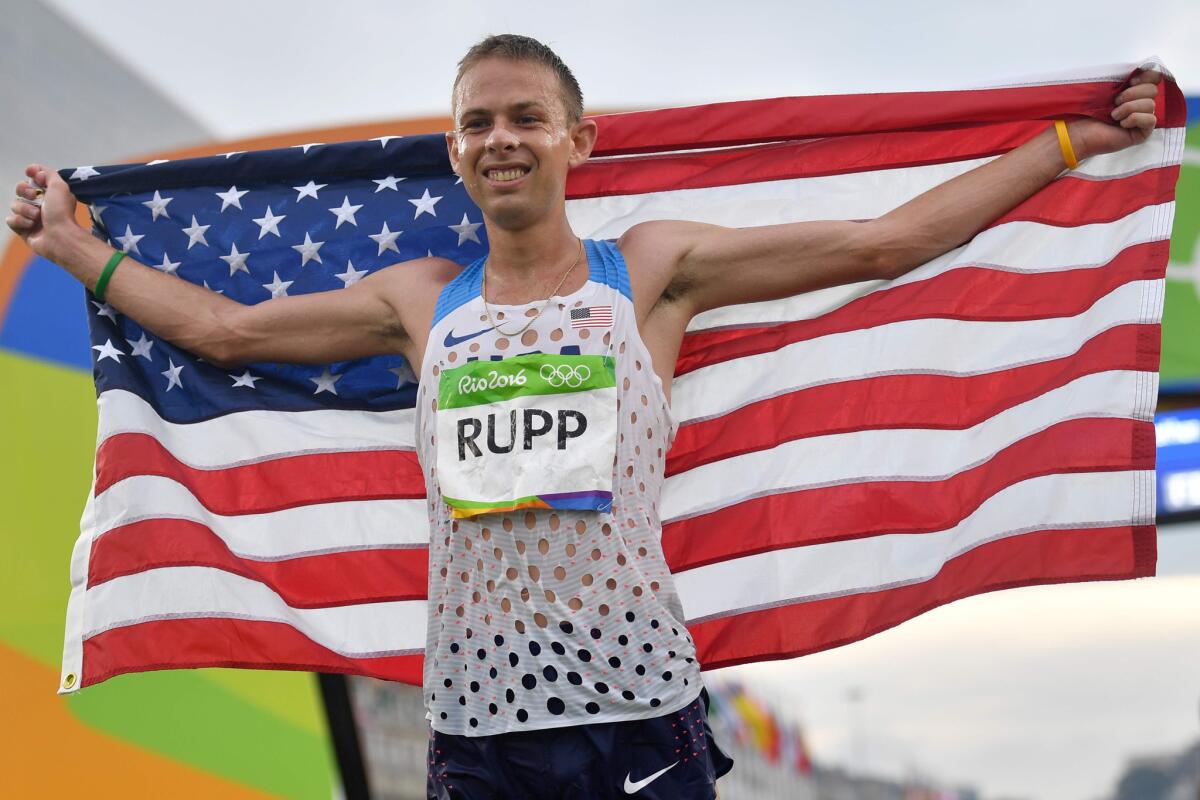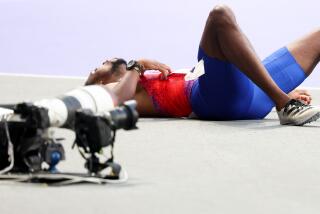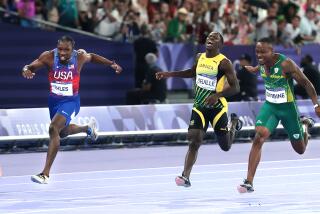Rupp gets bronze, but silver medalist gets all the attention in marathon

- Share via
Reporting from Rio de Janeiro — The beginning of Galen Rupp’s Olympic marathon career — opening with a bronze-medal performance — collided with the conclusion of Meb Keflezighi’s on Sunday.
The 30-year-old Rupp, competing in just his second marathon, took third behind Eliud Kipchoge of Kenya and Feyisa Lilesa of Ethiopia. Rupp ran a personal-best 2 hours 10 minutes 5 seconds, finishing 1 minute 21 seconds behind Kipchoge and 11 seconds back of Lilesa.
American Jared Ward was sixth in 2:11.30, a personal best, and Keflezighi, who said he had to stop seven times along the way due to discomfort, placed 33rd in 2:16.46.
It was how Keflezighi finished that will be remembered. The 41-year-old slipped in a puddle near the finish line. Rather than immediately getting up, he did three pushups and then crossed the line at Sambodromo.
Sunday was Rupp’s second event at these Games. He finished fifth in the 10,000-meter final.
“I feel like I let people down when I didn’t run well there,” Rupp said. “That was the hardest thing, I think. At some point you have to get over it. You can’t dwell on things.”
His coach, Alberto Salazar, told him he needed to turn the page. Salazar knew it would be a gamble to go for both events and even Rupp questioned the decision.
“Getting a bronze bailed me out,” Salazar said.
Said Rupp: “Alberto told me if you’re with Kipchoge, you’ll get a medal regardless. I really was just trying to sit back and relax and cover every move. I knew it was going to be hot out, deceptively so because it was raining beforehand. I knew the heat was going to take its toll. I kept telling myself, ‘Drink, drink, drink.’ Even still, I was definitely locking up the last couple of miles.”
For Keflezighi, there was a sense of pride in finishing after all his issues during the race, starting about halfway through.
“It’s tough because you run around the world four times in terms of mileage and this is the first victory lap. It was somebody [from] Tanzania … [who said,] ‘My country did not send me here to not finish,’” he said referencing John Stephen Akhwari’s words from the 1968 Olympics.
If there was humor in his pushups at the finish, there was drama when Lilesa crossed his wrists above his head as he approached the finish line. Lilesa explained the gesture was to express solidarity with the Oromo, Ethiopia’s largest ethnic group. He said he stood with protestors, and that the government was “killing our people.”
Later, it was mentioned that the International Olympic Committee discourages political protests.
Said Lilesa: “They can’t do anything. It’s my feeling.”
Henok Gabisa, an Ethiopian lawyer, echoed Lilesa’s thoughts about the danger in returning home. Gabisa said he is also concerned about the marathoner’s wife and two children in Ethiopia.
“Given that he is from Oromo, the most targeted and marginalized group of people in Ethiopia in economic and political realm, he is likely to be taken by government security force at the Addis Ababa airport upon arrival,” Gabisa, a visiting academic fellow at Washington and Lee University in Lexington, Va., said in an email to The Times.
“The fact that [he] showed solidarity with his people in the ongoing Oromo Protest, where according to New York-based human Rights Watch, over 500 Oromo people were killed over nine months for protesting against land policy of the Ethiopian government, his life could be in danger.”
twitter: @reallisa
MORE OLYMPICS NEWS
NBC’s filtered view of the Rio Games delivered on the things that mattered
Column: Kevin Durant wakes up and carries U.S. to more gold
These memories of the Rio Olympics are etched in the minds of our reporters
More to Read
Go beyond the scoreboard
Get the latest on L.A.'s teams in the daily Sports Report newsletter.
You may occasionally receive promotional content from the Los Angeles Times.







